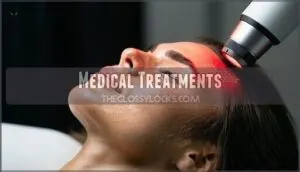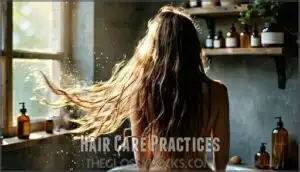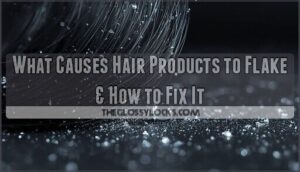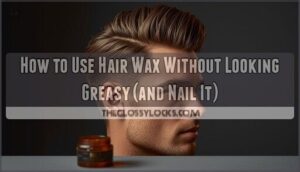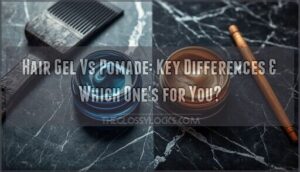This site is supported by our readers. We may earn a commission, at no cost to you, if you purchase through links.
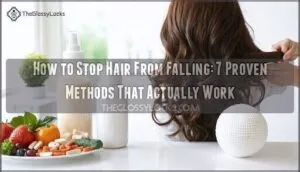
Start with protein-rich foods, biotin supplements, and iron if deficient. Switch to sulfate-free shampoos, avoid tight hairstyles, and massage your scalp regularly to boost circulation.
For persistent loss, consider FDA-approved treatments like minoxidil or finasteride. Stress management matters too – chronic stress literally makes hair jump ship.
Simple changes like silk pillowcases and wide-tooth combs reduce breakage. The secret isn’t just one magic bullet, but combining multiple proven strategies that work together.
Table Of Contents
- Key Takeaways
- Hair Loss Causes
- Stop Hair Falling
- Dietary Approaches
- Medical Treatments
- Hair Care Practices
- Frequently Asked Questions (FAQs)
- What causes hair fall?
- How to stop hair fall?
- How to prevent hair loss?
- Can you prevent hair loss if your hair falls out?
- How do you get rid of hair fall naturally?
- What should I do if my hair is falling out?
- What is the best treatment for hair falling out?
- Can hair grow back after thinning?
- How can I stop hair loss naturally?
- What does a dermatologist do for hair loss?
- Conclusion
Key Takeaways
- Nourish your hair from within – You’ll need adequate protein (40-60g daily), biotin supplements, and iron to give your follicles the building blocks they need for strong growth.
- Switch to gentle hair care practices – You should use sulfate-free shampoos, avoid tight hairstyles, massage your scalp daily, and skip heat styling to prevent breakage and trauma.
- Consider proven medical treatments – You can use FDA-approved options like minoxidil or finasteride if natural methods aren’t enough, but consult a dermatologist first.
- Address the root causes – You must tackle stress management, hormonal imbalances, and underlying medical conditions since hair loss often signals deeper issues your body’s dealing with.
Hair Loss Causes
You might notice more hairs in your brush and wonder what’s causing the change.
Noticing extra hair in your brush? It’s often your body’s way of signaling a change.
Hair loss can result from genetics, hormonal shifts, health issues, harsh hair care routines, or not getting the nutrients your body needs.
Genetic Factors
Genetics often deals the first card in your hair’s fate.
Hereditary patterns like androgenetic alopecia—what’s called male or female pattern baldness—are the most common hair loss genetic factors.
Family history is a powerful clue, and genetic mutations and other inheritance factors can raise your risk, while genetic testing may help predict or explain your unique story with alopecia areata.
Understanding the role of hormone related factors is essential in addressing hair loss.
Hormonal Changes
Life’s big moments—like menopause, pregnancy, or thyroid issues—often throw your hormones out of balance.
When hormone balance shifts, your hair may thin, shed, or feel lifeless.
Androgen effects can play a starring role, especially in women.
Hair loss and hormonal factors often go hand in hand, so talk with your doctor about restoring your hair loss and hormonal balance.
Understanding the hormonal change factors can help you address the root cause of your hair loss.
Damaging Haircare Practices
After hormones shift, your daily hair care routine can do a number on your roots.
Frequent heat styling, harsh chemicals, and tight braids all invite hair trauma—leading to breakage, split ends, and hair fall control headaches.
Swapping out damaging habits for gentler choices shields strands from chemical damage and keeps hair styling fun, not a case of constant hair damage.
Medical Conditions
Regarding hair loss causes, don’t brush off underlying medical conditions.
Things like Thyroid Issues, Autoimmune Disorders, and Hormonal Imbalance play a big part, while Skin Conditions and Infections can sneak up on you.
Watch out for:
- alopecia from autoimmune diseases
- androgenic alopecia due to hormones
- hair shedding from thyroid problems
- patchy spots from infections
Nutritional Deficiencies
Think of your hair as a garden—if the soil’s missing nutrients, plants won’t thrive.
Healthy hair starts with nourishing your roots—feed them well and watch your strands flourish.
Low protein intake, vitamin D, iron deficiency, or not enough zinc can sabotage hair growth. Ignoring nutrient balance, especially skipping Vitamin B and iron, means trouble.
Addressing nutritional deficiencies with proper Zinc Supplements and balanced nutrition can slow hair loss and malnutrition-related shedding.
Stop Hair Falling
If you’re watching more hairs circle the shower drain than you’d like, you’re not alone. With a few smart steps, you can take the reins on hair fall control and put yourself back in charge of your hair’s future.
Here are five clinical, proven regrowth tips and scalp care basics for stopping hair fall in its tracks:
- Use gentle, sulfate-free shampoos to reduce hair fall and irritation.
- Massage your scalp daily to boost blood flow and promote follicle health.
- Avoid heat styling tools; air dry whenever possible for better hair thickness.
- Switch to loose hairstyles to prevent breakage and support hair loss prevention.
- Consult a dermatologist early for personalized hair fall treatment options and better hair growth outcomes.
Understanding the role of hormonal imbalance is essential for effective hair loss treatment. Taking action makes all the difference, and it’s crucial for achieving better hair growth outcomes and successful hair regrowth.
Dietary Approaches
What you eat plays a direct role in how strong and healthy your hair grows, since your body relies on a steady supply of protein, vitamins, and minerals to support each strand.
By focusing on nutrient-rich foods and balanced meals, you help your hair resist breakage and loss.
Protein Intake
If you’ve been battling hair loss, double-check your plate for Dietary Protein. Hair needs Amino Acids to grow strong, like bricks in a wall.
Skimping on Protein Sources can slow Hair Growth and leave strands weak. Top hair strengthening tips include balancing nutrient-rich meals for Hair Nutrition and prevention.
Ensuring adequate protein supplement intake is vital for excellent hair health.
| Protein Sources | Hair Growth | Amino Acids |
|---|---|---|
| Eggs | Supports | Lysine |
| Beans | Thickens | Methionine |
| Greek Yogurt | Repairs | Cysteine |
| Fish | Nourishes | Arginine |
Vitamin Deficiencies
Vitamin deficiencies often sneak up like an unwanted guest, tipping the balance of your hair’s natural cycle.
Lack of vitamin B, iron deficit, and folate can spark nutrient imbalance, leading to thinning and brittle hair.
Biotin forte and zinc supplements support regrowth, while vitamin B12 and iron are heavy hitters for keeping your roots resilient against everyday stressors.
A deficiency can disrupt the hair follicle cycle, leading to excessive shedding.
Mediterranean Diet
A Mediterranean diet—famous for its role in heart health and diet inflammation control—offers a hair loss nutrition boost for anyone looking to keep their locks intact.
It’s packed with hair nutrients from olive oil, veggies, fish, and beans.
This hair loss diet helps support your gut microbiome too. Need recipe ideas? Try a salad loaded with these staples, which can also aid in diet inflammation control.
Hydration
Your scalp is like soil—without enough water intake, roots dry out fast.
Hydration is just as essential for healthy hair as it’s for your skin.
Humectants benefits, like those in gentle conditioners, draw moisture in.
Regular scalp hydration from both water and hydrating foods helps prevent hair loss and keeps hair strong.
Dehydration effects? Brittle hair, more shedding, which can be prevented with proper hydration.
Nutrient-Rich Foods
Drinking water is important, but what you eat matters, too.
Hair loss and nutrition go hand in hand, so put nutrient-rich foods on your plate.
For best results, aim for:
- Protein sources like eggs or beans
- Foods supporting vitamin intake—think leafy greens
- Minerals from nuts and seeds
- Mix up your diet variety daily to ensure you’re getting a balanced intake of minerals.
Medical Treatments
You have several medical options to help stop hair from falling, each proven to address different causes of hair loss.
Treatments like minoxidil, finasteride, laser therapy, and hair transplant surgery can restore hair growth when used as recommended by a healthcare professional.
Minoxidil
Minoxidil is a go-to hair loss treatment, available as a topical foam or oral solution.
Using the right Minoxidil Strength matters—5% tends to work best for most. Minoxidil Side-effects like dryness or itching are common but mild.
Some try a Laser Combination for extra results. Many users find success with products for hair loss.
For lasting hair regrowth, stick with your routine, and consult your doctor before switching to Oral Minoxidil.
Finasteride
When minoxidil alone doesn’t do the trick, you might consider finasteride for hair loss management.
It’s a prescription hair loss treatment that helps by blocking certain hormones.
Typical options include oral Finasteride Dosage or Topical Finasteride.
Watch out for potential Finasteride Side-Effects, but many find strong Finasteride Efficacy.
Alternatives exist, but this medication stands out for:
- Long-term results
- Easy dosing
- Well-studied benefits, making it a notable option for hair loss management.
Low-Level Laser Therapy
If pills aren’t your thing, lowlevel laser therapy (LLLT) offers a hands-free hair loss solution.
At-home lasers target hair follicles with specific light wavelengths, aiming to boost growth.
Laser Effectiveness varies, so look at research before buying.
Device Cost ranges from $200 to $1,000.
Most users notice few Therapy Side-Effects, but budget and patience matter with these hair loss therapies.
Hair Transplant Surgery
If laser treatments don’t do the trick, hair transplant surgery might get you closer to lasting hair restoration.
This surgical technique moves hair from thick spots to thinning areas, which is a permanent hair loss solution.
While procedure costs run high and recovery time can stretch for weeks, most folks see strong graft survival, but it’s essential to watch out for potential scarring risks.
Modern techniques like FUE offer benefits such as minimal scarring, making them a viable option for those seeking hair restoration.
Platelet-Rich Plasma Therapy
With PRP therapy, you get a hair loss solution that uses your own blood to boost scalp density.
PRP efficacy shows promise, but treatment cost varies, and injection frequency matters for results.
While hair restoration is safe and minimally invasive, future research will help refine this hair loss therapy.
- Plateletrich plasma stimulates follicles
- Improves hair thickness
- Safe, low risk
- Monthly sessions recommended
- Results last 12–18 months
Hair Care Practices
You can protect your hair and reduce shedding by adopting simple, effective care routines.
Paying attention to how you wash, style, and treat your hair helps prevent unnecessary damage and keeps strands stronger.
Gentle Hair Washing
After exploring medical treatments, let’s talk about gentle hair washing.
Use warm water, not hot, to protect roots.
Massage shampoo with fingertips, not nails, for even application.
Pat or squeeze dry with a soft towel—never rub.
Pick a wide-tooth comb for less hair breakage.
Always check product ingredients for harsh chemicals that worsen hair thinning.
| Water Temp | Shampoo App | Drying | Comb | Ingredients |
|---|---|---|---|---|
| Warm | Fingertips | Pat | Wide | Mild |
| Not Hot | Even Spread | Squeeze | Tooth | No Sulfates |
| Lukewarm | Gentle | No Rub | Soft | No Parabens |
| Tepid | Massage | Air | Detangle | Natural |
| Room Temp | No Nails | Towel | Anti-Snag | Plant-Based |
Scalp Massage
Scalp massage isn’t just relaxing—it’s a smart hair loss solution.
Try these massage techniques to boost circulation and encourage hair growth tips:
- Use fingertips in small circles, applying gentle pressure.
- Add oils for extra oil benefits and stress reduction.
- Massage daily to help with hair thinning and alopecia areata.
Consistency supports less hair fall and healthier roots.
Avoiding Tight Hairstyles
After a good scalp massage, pay attention to how you style your hair.
Tight ponytails, braids, or buns can lead to traction alopecia, causing hair loss and hair breakage.
Choose Hairstyle Alternatives like loose braids or Protective Styles to boost Hair Elasticity and Scalp Health.
For effective hair loss prevention tips, remember: gentle hairstyles mean healthier hair and happier roots.
Reducing Hair Trauma
If you’re letting go of tight ponytails, it’s time to think about Gentle Detangling and Nighttime Care.
Avoid Heat Styling and harsh Chemical Treatments like hair coloring or hair straightening—these can cause hair breakage and hair damage.
Air dry after washing, skip rough towels, and choose Protective Styles.
Addressing damage often requires bond-building treatments to repair hair.
Treat your hair kindly, and you’ll see less hair falling.
Natural Remedies
If you’re tired of worrying about hair trauma, natural remedies offer gentle support.
Herbal treatments like rosemary oil and onion juice help boost scalp health. Essential oils, DIY masks, and Ayurvedic medicine can support natural hair growth.
Try hair fall remedies using peppermint or aloe vera. Many swear by hair loss natural remedies for safe, effective results—no magic, just science.
You can find rosemary oil products online.
Frequently Asked Questions (FAQs)
What causes hair fall?
Hair fall happens when you’re dealing with genetics, stress, hormonal shifts, poor nutrition, or harsh styling habits that damage your follicles and disrupt natural growth cycles.
How to stop hair fall?
Stopping your hair’s dramatic exit requires a multi-pronged approach.
You’ll need proper nutrition with adequate protein, gentle hair care practices, stress management, and potentially medical treatments like minoxidil for effective results.
How to prevent hair loss?
You can prevent hair loss by eating enough protein (40-60g daily), taking biotin supplements, using gentle hair care practices.
Managing stress levels is also crucial in preventing hair loss.
Consulting a doctor about FDA-approved treatments like minoxidil can provide additional solutions to hair loss.
Can you prevent hair loss if your hair falls out?
Yes, you can often prevent further hair loss even after experiencing some shedding.
Early intervention with proven treatments like minoxidil, finasteride, proper nutrition, and gentle hair care practices can halt progression and sometimes restore growth.
How do you get rid of hair fall naturally?
You can naturally reduce hair fall by massaging your scalp daily, eating protein-rich foods like eggs and beans, taking biotin supplements, avoiding tight hairstyles, and managing stress levels effectively.
What should I do if my hair is falling out?
Like a garden losing its blooms, you’ll want to consult a doctor first to identify the root cause.
Then consider proven treatments like minoxidil, improve your diet with adequate protein.
And avoid tight hairstyles that stress your scalp.
What is the best treatment for hair falling out?
Start with FDA-approved minoxidil (Rogaine) for immediate results, then consult a dermatologist about finasteride or PRP therapy. Address nutritional deficiencies with protein, iron, and biotin supplements while avoiding damaging hairstyles.
Can hair grow back after thinning?
Don’t panic thinking it’s irreversible damage. Yes, hair can regrow after thinning if you address underlying causes like nutritional deficiencies, stress, or hormonal imbalances quickly.
How can I stop hair loss naturally?
You can slow hair loss by eating protein-rich foods, taking biotin supplements, massaging your scalp gently, avoiding tight hairstyles, and managing stress effectively through relaxation techniques.
What does a dermatologist do for hair loss?
Ironically, you’re seeking a hair loss specialist just when your scalp needs one most.
A dermatologist diagnoses your specific hair loss type, prescribes treatments like minoxidil or finasteride, and offers advanced therapies including PRP injections.
Conclusion
Stopping hair loss isn’t rocket science, but it requires commitment to proven methods.
By combining proper nutrition, gentle hair care practices, and medical treatments when necessary, you can effectively learn how to stop hair from falling.
Remember that consistency matters more than perfection. Start with dietary improvements and scalp care, then consider professional treatments if needed.
Your hair’s future depends on the actions you take today, which is why proper nutrition is crucial.
- https://medicover-genetics.com/the-genetics-of-hair-loss-alopecia-and-more/
- https://www.mayoclinic.org/diseases-conditions/hair-loss/symptoms-causes/syc-20372926
- https://medlineplus.gov/genetics/condition/androgenetic-alopecia/
- https://www.advancedhair.com/learn/who-do-you-inherit-hair-loss-from-your-moms-side-or-your-dads-side
- https://pmc.ncbi.nlm.nih.gov/articles/PMC8610059/






